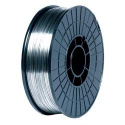|
My title, if I ever get, it, will say "Automation Engineer", I want to do the terminal line in either robotics or mechatronics.
|
|
|
|

|
| # ? May 16, 2024 14:28 |
|
Nihilanthic posted:BEFORE Junior and Senior years? Or during? And you only get them for one summer? I'm a bit confused. Sorry, yeah it's a little confusing in my post. I meant the summers prior to your junior and senior years. Some people maintain internships throughout the school year, but not many. Certainly not me. I like to maintain some semblance of a social life.
|
|
|
|
Slumpy posted:Has anyone here been horrible at math and decided to become an engineer? How did that work out? Yep me, I've just finished my first year of Aerospace Engineering down here in Australia. Didn't do too well school and did the lowest maths I could, which I still didn't do too well at. However with persistence, a lot of hard work and some tutoring it's kind of clicked and I'm now loving it. I did however spend most of last year back at TAFE which I think it like your community college? To be eligible for the University course I had to get myself up to speed with the maths and physics that I didn't do at school, seemed to do alright with passes in everything so I started it this year. That being said though the last 12-18 months have been pretty loving mental with the amount of stuff I've had to take in and I questioned whether I would be able to do it many times. However it all seems to be coming together now, finally. I'm lucky I'm still supported by my parents because if I was working to support myself as well as trying to learn everything I've had to then I don't think I would have been able to do it. Just depends how hard you are prepared to work at it, if it's really what you want to do then I'd say go for it. Matisyahu fucked around with this message at 23:21 on Nov 16, 2009 |
|
|
|
This seems like a good place to ask. I'm trying to decide where to study abroad for a year. I'm currently studying aerospace engineering at the University of Leeds in the UK. My main focus is North America. I'm thinking of Rensselaer (New York State), the University of Victoria (Vancouver Island, Canada), University of Waterloo (ontario) and potentially some others (eg McMaster (ontario), McGill (Montreal), Uni o Illinois (urbuna champaign...), Georgia Tech and there's a bunch of others). However, I'm trying to balance these things out. Georgia Tech and Rensselaer are both pretty good unis, but their locations are a bit uninspiring and they're in the US, so I wouldn't be able to drink. However, trading academically down slightly and going somewhere like Victoria would mean I'd be able to drink, and be in an awesome area quite close to mountains and various other things. Ontario would be pretty dull probably, but I've got a lot of family living there (all completely crazy though..). Additionally, for some of those I'd have to switch my major to Mechanical Engineering (not a huge deal, but I quite like planes!). So what do you think, wise engineers of SA?
|
|
|
|
dayman posted:
Civil is on the low end of the totem pole. Oh well, I personally don't give a poo poo what other engineering disciplines think about us. dayman posted:That being said, I'm in my last semester in the Civil and Environmental Engineering program at UMass Amherst and I'll soon be employed as a foreman at a large construction firm. Hope your job is solid. A lot of my friends that work at Granite and Kiewit have been laid off. Engineering comes before construction and until we see a turn around in the design sector the construction sector will be hurting. It will be interesting to see what happens after the stimulus money is gone (although none of our clients have seen a dime or want any for what we do). dayman posted:My experiences with CE are as follows: Group work yes all the time. While knowing CAD is helpful. It was only helpful in maybe 4 of my undergrad classes. Realistically you *should* never use autoCAD. You have CAD techs who have a charge rate of at least 1/2 of yours. It is not feasible to have engineers do drafting work. You may use a CAD modeling program (I use PLS-CADD, POLE, Tower daily, CIVIL 3D may be used for road modeling (very cool program btw), etc) but you should not be producing the final project drawings. dayman posted:-Pick a concentration early on. There are a ton of jobs that come under the heading of "Civil Engineer" but the big areas are Structural, Geotechnical, Environmental and Transportation. Research these areas early and find the one that interests you the most. Then take classes that will prepare you for the chosen area. It will make you a lot more marketable in your chosen area once you graduate. Word of caution though, Structural and Geotechnical both all but require an MS to work on anything fun so if you go into either with a BS be prepared for some CAD jockey work. I agree with this (also add the the list Water Resources and Construction). I disagree that you need an MS to do anything in Structural and Geotech though. I concentrated in structural and had 4 job offers that were all very cool (false work, off shore oil rigs, waste water plants, transmission lines) although I did take grad level steel design and foundation design(soils). Like I said above you will do little CAD drawing work... dayman posted:-Get interships. Seriously, an internship with this firm is the only reason I'm getting a job right now in this economy. Work an intership during the summer before both your junior and senior years, do not skip this step! This is the best advice you can give to anyone. I had so many interviews based on two internships and good GPA that I had to turn some down because I had no time for them. I will also say if your school is worth a drat they will have a good job fair (read 150-300 companies minimum) and go in your freshman and sophomore year. Odds are low you will get anything but you will make contacts. People remember who you are and it will help you in your 3rd and 4th year. dayman posted:That's about it. I've absolutely had a blast during my time in the college of engineering. It really changes the way you think about and view the world in profoundly positive ways. Honestly it makes me feel like a superhero sometimes to look at problems that most laypersons would just resign themselves to not understanding and be able to apply the skills I've learned to dissecting, analyzing and finding a solution for them. Yes Yes...we are all nerds who can solve any problem our family has and will design your barn/house/garage....etc
|
|
|
|
leo_r posted:This seems like a good place to ask. Personally, when studying abroad I feel you should take zero eng classes. Get all of the generals done in your year overseas. Just go out and enjoy the rest of the world, explore, see new things and have a good time. To me that is the reason to go abroad.
|
|
|
|
spwrozek posted:Personally, when studying abroad I feel you should take zero eng classes. Get all of the generals done in your year overseas. Just go out and enjoy the rest of the world, explore, see new things and have a good time. To me that is the reason to go abroad.
|
|
|
|
Anonymaus posted:Can anyone tell me what Systems Engineering is like? Maybe this is a bit late, as you posted yesterday, but anyway... I'm doing my PhD and I'm working with a guy just finishing an EngD in systems engineering. My take on it is that if you've got 'proper' engineering on one side and business management/human factors on the other, then systems engineering is somewhere in the middle. The undergrad systems engineers share their first year classes with elec eng, but as they progress they spend more time doing 'systems' stuff - basically looking at how socio-technical factors relate to the design process, how business works, ergonomics etc. At least I *think* that's what they do. It's a bit of a black art in some ways, and thus can often be seen as a bullshit soft science. This is a little bit unfair, as 'systems' thinking is more important than most give it credit for, but personally I think a lot of the systems stuff you would pick up along the way as a regular working engineer anyway. If you can put up with learning a whole new vocabulary, looking past the bullshit and are interested in more of a managerial career then it could be for you. If you're more into actually 'engineering' things, then skip it. A flippant way to describe a systems engineering degree would be "The study of how to fit the one of the following phrases into every sentence you speak and have nobody else care: System, Sub-system, sub-sub-system, system level, system environment, socio-technical system, service orientated system, system interconnections, system, system, system, system, I'm thinking about the problem at a high level - the implementation and commissioning will be done by the experts"
|
|
|
|
dayman posted:I also have a B.S. in Chemistry if some people on the fence about ChemE want to ask questions about the dark side. I guess this isn't addressed directly at you, but in general, how important is Calculus and other maths to ChemE?
|
|
|
|
Traitorous Leopard posted:I guess this isn't addressed directly at you, but in general, how important is Calculus and other maths to ChemE? Pretty darn important, because it leads into differential equations, which is a ChemE's bread and butter. Differential equations apply to things like fluids, reaction kinetics, heat and mass transfer, modeling dynamics, and process control. It also mattered a lot in some of electives I took, like chaos theory and protein interactions. I had to use a decent amount of it in my undergraduate research to model surface tension forces in self assembling systems.
|
|
|
|
plester1 posted:Pretty darn important, because it leads into differential equations, which is a ChemE's bread and butter. Pretty much this, yeah. I can't think of an area of chemical engineering that doesn't depend on calculus/differential equations.
|
|
|
|
leo_r posted:This seems like a good place to ask. (speaking only about Canada) BC is one of the most beautiful and vibrant places in Canada, especially Victoria and the coast. Quebec is nothing to shake a stick at either, but I still prefer BC. If you are looking for a top tier school, Waterloo is consistently ranked first or second, but the town and general area is kinda boring. McMaster I don't know much about, but I imagine it wouldn't be much more interesting than Waterloo (do not take my word on that part, though, I haven't been to Hamilton myself.) I agree that a term abroad should be something to enjoy, not something to spend working your butt off. I have no plans currently to spend a term abroad, but if I did, I would choose my location before I even looked at schools in the area.
|
|
|
|
The problem is that I a) Have a list of schools I can choose from which isn't very large, and b) have to take pretty much all engineering classes. The UK system is different to the north american system, and because the year is seen as my third year, I have to study what I'd cover in my third year at home. That means modules rougly equivalent to these. No English or Business modules for me!
|
|
|
|
plester1 posted:Pretty darn important, because it leads into differential equations, which is a ChemE's bread and butter.
|
|
|
|
Is it possible to get internships within a Community College? Should I crash a job fair at a University that I would be transferring to, or just eat the two years. Also, at least just looking around online, computer engineers seem to not be hiring NEARLY as much as other engineering or computer fields - but everyone wants a "software engineer" or someone with a CS/CIS degree?  Am I looking in the wrong place, is it a matter of 'computer' making all the software jobs shove down the CompE jobs, or are they really just not there?
|
|
|
|
Nihilanthic posted:Is it possible to get internships within a Community College? Should I crash a job fair at a University that I would be transferring to, or just eat the two years. The different fields overlap a lot, and so do the job opportunities. There are plenty of computer engineers working in jobs that are normally held by people who studied computer science or electrical engineering. It also just really depends where you look. If you go straight to the career websites of the right companies, you'll find plenty of postings looking for computer engineers.
|
|
|
|
Nihilanthic posted:Is it possible to get internships within a Community College? Should I crash a job fair at a University that I would be transferring to, or just eat the two years. Job fairs (at least in engineering) these days seem mostly to be a waste of time.
|
|
|
|
BeefofAges posted:The different fields overlap a lot, and so do the job opportunities. There are plenty of computer engineers working in jobs that are normally held by people who studied computer science or electrical engineering. It also just really depends where you look. If you go straight to the career websites of the right companies, you'll find plenty of postings looking for computer engineers. Well, now the question would be 'what are those companies' and 'how does one find out'? Its also not as if I'm AGAINST doing software, at any event, I just wanted to give hardware a shot. After getting told by someone about the difficulties of doping things when something being off by an atop can screw up a channel and how the speed of light is actually a tangible problem, and modern cpus already put out more heat/area than a toaster, it piqued my interest. That has to be interesting to try to wrangle and overcome, though by the time I get out of school cutting edge stuff might not even be CMOS anymore. I wonder when spintronic engineers will start coming out of universities
|
|
|
|
I'm a undergraduate mechanical engineer graduating this December. Anybody know of entry level job openings? I'm in Seattle but I'm willing to relocate. Skills include CAD, CFD, HVAC experience, all the typical school theory jazz. I'm keen for aerospace or navy stuff but open to new ideas. Thanks
|
|
|
|
Nihilanthic posted:Well, now the question would be 'what are those companies' and 'how does one find out'? VLSI is but one part of the design process. You have to remember that all of these computery majors encompass dozens of different fields and specializations. Depending on what you want to do, you might find computer engineering job listings at all of the major computer component manufacturers (AMD, Intel, NVidia, Seagate, Western Digital, HP, Samsung, Toshiba, Hitachi, Apple, etc.) or at one of the millions of smaller companies you can find if you look carefully. Embedded systems especially seem to often be developed by small specialized companies.
|
|
|
|
Nihilanthic posted:and modern cpus already put out more heat/area than a toaster Do you really want to get excited? Modern CPUs put out more heat per area than the Space Shuttle sees on its underside during reentry.
|
|
|
|
evensevenone posted:Do you really want to get excited? Modern CPUs put out more heat per area than the Space Shuttle sees on its underside during reentry. Do you have a source you can post on this? I'd like to share it with someone but I don't want to just repeat heresay. Thanks.
|
|
|
|
BeefofAges posted:VLSI is but one part of the design process. You have to remember that all of these computery majors encompass dozens of different fields and specializations. VLSI was probably my favorite course that I've taken. Not only did we get to learn about it, but the teacher was awesome. We had a project in that course to design a 4-bit multiplier... from the transistor level up until everything besides fabrication. Unfortunately, the software we were using only allows us to go down to the 0.5 micro level, so it wasn't as modern as the new transistors, but laying out your own n-wells and p-wells, then doing the metals and stuff was actually super interesting.
|
|
|
|
Is anyone in here studying electromagnetism? And if so, what does this involve? I'm trying to find information on what an electromagnetic engineer does but it is kind of convoluted and isn't explaining what kind of things are learned through this path of study. I assume there is a lot of physics but what makes this different from a physics degree? Also if you are in grad school please tell me what types of things you are doing academically.
|
|
|
|
Dangbe posted:Is anyone in here studying electromagnetism? And if so, what does this involve? I'm trying to find information on what an electromagnetic engineer does but it is kind of convoluted and isn't explaining what kind of things are learned through this path of study. I assume there is a lot of physics but what makes this different from a physics degree? Also if you are in grad school please tell me what types of things you are doing academically.
|
|
|
|
I ended up getting an internship with ABB in Switzerland, which is really exciting.  ...Except I don't know how to use MatLAB or LABView at all. =[ Does anyone have any books they'd recommend for learning either program, or will I be able to figure it out by following the tutorials that come with each program (and liberal use of the Help menu + internet)?
|
|
|
|
Colmface posted:I ended up getting an internship with ABB in Switzerland, which is really exciting. You'll be fine.. both have great in-program help and large internet communities. I learned labview from scratch when I started my job and it picked it up right away. Matlab is a little tougher if you're doing complex things but like I said the help and tutorials available are awesome.
|
|
|
|
Colmface posted:I ended up getting an internship with ABB in Switzerland, which is really exciting. For LabVIEW see if you can find the Basics I or Basics II CD based training materials at your school. They're included in the academic version of LabVIEW (last two CDs in the lovely little binder). Some lab at your school almost certainly has it; ask some grad students if they know anything (or ask a professor, who will send you to their grad students). If you really want to go in strong, try and pass the CLAD practice exams. (hell, you could get the certification if you really want to spend $129; they'll mail you a shiny certificate too!) As for MATLAB, I never really did much past in class instruction, going through old code and lots of reading help files. Many schools have "Introduction to MATLAB" powerpoints and exercises online, I can't personally recommend any, but googling will reveal a ton. Both programs should be in some computer labs at your school, they may even have training materials there too!
|
|
|
|
heyniceperro posted:You'll be fine.. both have great in-program help and large internet communities. I learned labview from scratch when I started my job and it picked it up right away. Matlab is a little tougher if you're doing complex things but like I said the help and tutorials available are awesome. LabVIEW is an extremely easy program to pickup, and National Instruments has great customer and community support to boot. Matlab's built in help functions will list and give examples of every function it comes with simply by typing in 'help whatever'. If you're comfortable with basic programming then Matlab is cake compared to something like C. My University used it extensively throughout the EE curriculum, but other majors may get less exposure.
|
|
|
|
Dangbe posted:Is anyone in here studying electromagnetism? And if so, what does this involve? I'm trying to find information on what an electromagnetic engineer does but it is kind of convoluted and isn't explaining what kind of things are learned through this path of study. I assume there is a lot of physics but what makes this different from a physics degree? Also if you are in grad school please tell me what types of things you are doing academically. I studied EE in undergrad, then did an MSEE in electromagnetism. Most E&M research groups can be split into either computational stuff (FEM, FDTD, MoM, etc) and theoretical stuff. Both apply themselves to making new and better devices (amplifiers, filters, mixers, matching networks, antennas, etc) or to studying other electromagnetic problems (EMI, EMC, propagation in various environments, etc). Computational guys also work a lot on improving simulation methods (speed and/or accuracy). Both will include the same basic theory, but the theory guys will do a bit more stuff on paper and a bit less stuff on the computer. If you're a theory guy who writes a paper describing how a new type of filter works, with equations, along with simulation results (inputs and outputs), and experimental results, you can bet good money that within a few months, a paper will come out by a computational guy that shows exactly what your filter is doing between the input and output with all sorts of fancy diagrams. Courses I studied in grad school: Applications of the Finite Element Method to Field Problems Electromagnetic Theory Computational Electrodynamics (FDTD stuff) Medical Imaging EMC, Sensors, & Instrumentation My research in grad school was on microwave devices using metamaterials (transmission lines with a negative permittivity and permeability). Also in fourth year I took Microwave Circuits and Radio & Microwave Wireless Systems, plus all the usual EM courses. Outside of this stuff, there's not much other 'physics,' given that all of this stuff is physics, of course. If I had gone on to do a PhD, I would have branched out a bit into optics/photonics, and quantum mechanics. When I finished my MSEE, I had a job offer in the defense industry, designing waveguide components (filters, mux, demux) for satellites. I didn't take it and went into a different industry. No regrets, but that satellite job would have been cool as hell. More questions? Let me know.
|
|
|
|
Ayudo posted:LabVIEW is an extremely easy program to pickup, and National Instruments has great customer and community support to boot. But dear god can people that "just picked it up" create unholy messes of timing issues and race conditions. I probably shouldn't complain, as that is whats paying the bills right now, but still...
|
|
|
|
Are there any options for getting a Bachelor of Engineering degree part time? Specifically mechanical? I'm interested in the subjects of renewable energy and HVAC systems, and I'd like to learn formally about it, but I don't want to go back to being a full time student.
|
|
|
|
Zachsta posted:Are there any options for getting a Bachelor of Engineering degree part time? Specifically mechanical? I'm interested in the subjects of renewable energy and HVAC systems, and I'd like to learn formally about it, but I don't want to go back to being a full time student. Yes and yes.
|
|
|
|
Colmface posted:I ended up getting an internship with ABB in Switzerland, which is really exciting. I took a LabVIEW class in the applied physics department here over the summer and I used Hands On Introduction to LabVIEW for Scientist and Engineers. It was a really good book, having you work through exercises as the chapter goes on, and then gives you problems to do at the end of each chapter. A friend of mine likes LabVIEW for Everyone: Graphical Programming Made Easy and Fun but I've never used it.
|
|
|
|
Any australians in here who have experience with the process of getting chartered?
|
|
|
|
slorb posted:Any australians in here who have experience with the process of getting chartered? Basically you'll find all the operators are neutral about it and all the consultants push it - Mostly because it means they can charge you out at a higher rate. This is speaking for the chemical/process/oil&gas/mining industry by the way. All it does is give you the right to pracitce as an independant consultant, so maybe it's worth it down the line? It doesn't mean you can't practice overseas if you're not chartered (except in countries like Canada, where you do the work and they just get some Canadian guy to sign off things) If you're still keen and if you're a chem eng, then don't even bother with Engineers Aust. Go through IChemE instead.
|
|
|
|
namsdrawkcaBehT posted:Basically you'll find all the operators are neutral about it and all the consultants push it - Mostly because it means they can charge you out at a higher rate. This is speaking for the chemical/process/oil&gas/mining industry by the way. Its part of the graduate program I'm in so I'm going to end up chartered. I'm really just confused about the process. Thanks for the perspective, I didn't realise there were other bodies worth signing up for beyond engineers australia.
|
|
|
|
I had a question for Canadian Engineering Goons. From what I understand, to be considered an engineer in Canada, I need to get my P.Eng. Now this isn't such a big deal because I planned on doing it anyways. But before I do that, I need to work directly under an engineer (with their P.Eng) that can attest to my work as a Jr. Engineer as far as I understand. To get to the status of Jr. Engineer I have to apply to whatever my provinces engineering society is (i'm in Quebec right now so it's OIQ), get approved and then get the title. The two things i'm wondering are: 1) I'm currently working as a programmer, which is part of the computer engineering field, thanks to my computer science degree. Now I know the senoir programmer at my company has a degree in Civil Engineering, but i'm not sure if he ever got his P. Eng. (I plan on asking him next time I see him). I was wondering if there may be a chance my work experience can be applied towards my time as a Junior Engineer (or at least some of it) even though I don't yet have my Bachelors? The second is, if I do my P. Eng in Quebec, where it takes 2 years of experience before I can write the exam, and then I go West (or South to the States, though I don't know their requirements) where it takes 4 years experience, will it still be recognized? I'd assume yes since i'd have already passed the exam, but I just want to know what some of you think. Thanks guys, this thread is awesome.
|
|
|
|
In the US, each state has its own requirements for a PE. Some have reciprocity and recognize PEs licensed in other states, others have comity and recognize the requirements but require a PE apply for a license, but some make you go through the whole goddamn thing again. Generally, states with stricter licensing requirements will not recognize PE licenses from states with looser requirements. From the sounds of it, Canadian territories are similar. If you wanted a license in the US, you'd have to take the US licensing exam and go through the whole process again. (All US states use the same exams, so that much is universal.)
|
|
|
|

|
| # ? May 16, 2024 14:28 |
|
Phlegmbot posted:Yes and yes. Cool. Does anyone know of any good part-time programs in the NYC area?
|
|
|


























